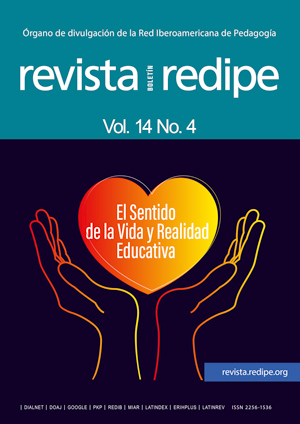Formación y competencias futuras de los nuevos profesionales par entornos sostenibles
##plugins.themes.bootstrap3.article.main##
Keywords
Resumen
Nowadays, it is important to develop skills in the human talent of organizations and so that they can compete as an intelligent and innovative organization. Investing in an organization’s human talent should be part of the mission of every entity in a globality of new technologies and artificial intelligence. Communication skills, collaboration, teamwork, creativity, resilience etc. are still important today.
Referencias
American Psychological Association. (2017). Retrieved from APA Dictionary of Psychology: https://dictionary.apa.org/resilience.
Arum, R., & Roksa, J. (2011). Academically adrift: Limited learning on college campuses. University of Chicago Press.
Banco Mundial. (2016). World Development Report 2016: Digital Dividends. World Bank. Retrieved Marzo 15, 2022, from https://www. worldbank.org/en/publication/wdr2016
Blakemore, S., & Mills, K. (2014). Is adolescence a sensitive period for sociocultural processing? Annual Review of Psychology, 187-207.
Castillo-Gualda, R., García, V., Pena, M., Galán, A., & Brackett, M. (2017). Resultados preliminares del método RULER en la inteligencia emocional y el compromiso laboral de profesores españoles. Electronic Journal of Research in Educational Psychology, 15, 641- 664. Retrieved Marzo 2020, from http://www. investigacion-psicopedagogica.com/revista/arti culos/43/espannol/Art_43_17068
Csapó, B., & Funke, J. (2017). The nature of Problem Solving: using research to inspire 21st Century Learning Educational Research and Innovation. Paris: OECD Publishing
Davies, A., Devin, F., & Gorbis, M. (2020). Future Work Skills. Palo Alto: Institute for the Future for the University of Phoenix Research Institute.
Frey, C. B., & Osborne, M. A. (2017). The future of employment: How susceptible are jobs to computerization? Technological Forecasting and Social Chang, 114(C), 254’280.
ILO. (2021). Global Framework on core skills for life and work in the 21st century. Geneva: ILO Publications.
Institute of Design at Stanford. (n.d.). Miniguía: una introducción al Design Thinking + Bootcamp bootleg. En español. (H. Plattner, Ed., & F. González, Trans.)
McKinsey Global Institute. (2017). Jobs lost; jobs gained: Workforce transitions in a time of automation. McKinsey&Company.
Morduchowicz, R. (2021). Competencias y habilidades digitales. Montevideo: UNESCO office Caribbean.
Mujis, D., & Bokhove, C. (2020). Metacognition and Self-Regulation: Evidence Review. London: Education Endowment Foundation. Retrieved Mayo 2022, from https://d2tic4wvo1iusb. cloudfront.net/documents/guidance/ Metacognition_and_self-regulation_re - view. pdf?v=1642679296.
OECD. (2019). Education and Skills 2030: Conceptual Learning Framework. Draft OECD Learning Compass 2030 Construct Analysis. 10th Informal Working Group Meeting. Seoul, Korea: Directorate for Education and Skills. Education Policy Commitee.
Seligman, M., Randal, M., & Lincoln, E. (2009). Well-being in Schools Positive Education: positive psychology and classroom interventions. Oxford Review of Eduction, 35(3).
UNESCO (2020). International Forum on AI and the Futures of Education: Developing Competencies for the AI Era.
UNESCO. (2021). Futures of Education.
UNESCO (2022). Recomendación sobre la ética de la Inteligencia artificial.
Arum, R., & Roksa, J. (2011). Academically adrift: Limited learning on college campuses. University of Chicago Press.
Banco Mundial. (2016). World Development Report 2016: Digital Dividends. World Bank. Retrieved Marzo 15, 2022, from https://www. worldbank.org/en/publication/wdr2016
Blakemore, S., & Mills, K. (2014). Is adolescence a sensitive period for sociocultural processing? Annual Review of Psychology, 187-207.
Castillo-Gualda, R., García, V., Pena, M., Galán, A., & Brackett, M. (2017). Resultados preliminares del método RULER en la inteligencia emocional y el compromiso laboral de profesores españoles. Electronic Journal of Research in Educational Psychology, 15, 641- 664. Retrieved Marzo 2020, from http://www. investigacion-psicopedagogica.com/revista/arti culos/43/espannol/Art_43_17068
Csapó, B., & Funke, J. (2017). The nature of Problem Solving: using research to inspire 21st Century Learning Educational Research and Innovation. Paris: OECD Publishing
Davies, A., Devin, F., & Gorbis, M. (2020). Future Work Skills. Palo Alto: Institute for the Future for the University of Phoenix Research Institute.
Frey, C. B., & Osborne, M. A. (2017). The future of employment: How susceptible are jobs to computerization? Technological Forecasting and Social Chang, 114(C), 254’280.
ILO. (2021). Global Framework on core skills for life and work in the 21st century. Geneva: ILO Publications.
Institute of Design at Stanford. (n.d.). Miniguía: una introducción al Design Thinking + Bootcamp bootleg. En español. (H. Plattner, Ed., & F. González, Trans.)
McKinsey Global Institute. (2017). Jobs lost; jobs gained: Workforce transitions in a time of automation. McKinsey&Company.
Morduchowicz, R. (2021). Competencias y habilidades digitales. Montevideo: UNESCO office Caribbean.
Mujis, D., & Bokhove, C. (2020). Metacognition and Self-Regulation: Evidence Review. London: Education Endowment Foundation. Retrieved Mayo 2022, from https://d2tic4wvo1iusb. cloudfront.net/documents/guidance/ Metacognition_and_self-regulation_re - view. pdf?v=1642679296.
OECD. (2019). Education and Skills 2030: Conceptual Learning Framework. Draft OECD Learning Compass 2030 Construct Analysis. 10th Informal Working Group Meeting. Seoul, Korea: Directorate for Education and Skills. Education Policy Commitee.
Seligman, M., Randal, M., & Lincoln, E. (2009). Well-being in Schools Positive Education: positive psychology and classroom interventions. Oxford Review of Eduction, 35(3).
UNESCO (2020). International Forum on AI and the Futures of Education: Developing Competencies for the AI Era.
UNESCO. (2021). Futures of Education.
UNESCO (2022). Recomendación sobre la ética de la Inteligencia artificial.



